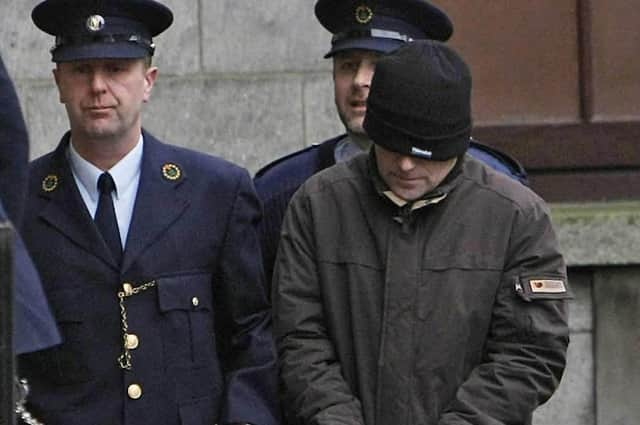Ruth Dudley Edwards: Thank you Lithuania for pursuing Omagh bomber


The European Arrest Warrant alleges that between the end of 2006 and early 2007, Campbell “made arrangements, while acting in an organised terrorist group, the real Irish Republican Army (RIRA), to acquire a substantial number of firearms and explosives from Lithuania and smuggle them into Ireland”.
His brother Michael, who fell foul of a 2008 MI5 sting recording him attempting to buy explosives and guns, was found to have been a co-conspirator and spent time in a Lithuanian jail but was then released by the appeal court after his lawyers argued that he was a victim of entrapment.
I‘m too cautious to feel joy about the verdict on Liam.
Advertisement
Hide AdAdvertisement
Hide AdI’ve known about Campbell for more than two decades and I know how relentlessly he instructs lawyers to use every technical device to evade justice — as he was ruthless in killing for his ideology of hate.
In 2013 he had been released from four years of custody in Northern Ireland on the grounds that extradition would be a breach of his rights. But the Lithuanians clearly are angry and persistent and on their third attempt, begun in 2016 in the Republic, and after years of frustration over technical challenges, on the face of it, it looks as if this very bad man has at last exhausted every legal route and could face a long stint in a foreign jail.
We can always hope.
Since I began to write about Northern Ireland in the mid 1990s, I’ve always known which side I was on: that of innocent victims.
Later, as the criminal justice system failed the families of the dead and injured in the devastating 1998 Omagh bombs, I became part of the group seeking to launch a civil case against the bombers.
Advertisement
Hide AdAdvertisement
Hide AdCampbell was one of those identified early on, so he’s been on my mind for more than two decades.
I’ve spent a lot of my professional life following the careers of mass murderers, but he is one of the most chilling.
Here is his first appearance in the book I would write about the case in 2009, describing what had gone on in the Real IRA after its formation in 1997 following a split in the Provisionals.
At its head was Michael McKevitt, the Provos’ ex Quartermaster General who had sat on the IRA executive with people who are now in receipt of incomes from the British state.
Advertisement
Hide AdAdvertisement
Hide AdHis wife, Bernadette Sands McKevitt, was the sister of Bobby Sands and a virulent opponent of the peace process.
“In a decision that would spell disaster for the people of Omagh,” I wrote in my book, “thirty-five-year-old Liam Campbell became Director of Operations for Northern Ireland. He was a cabinetmaker, farmer and smuggler of tobacco, alcohol and fireworks; conveniently, he lived at Faughart, right on the border in County Louth, not far from McKevitt’s home in Blackrock, a seaside village three miles from Dundalk.
“Campbell too came from an IRA background: one of his brothers had been blown up by his own landmine, another served fourteen years for terrorist offences. But Liam was more hardline than either of them; in 1983 his terrorist activities on the border had resulted in the British government taking the exceptional step of banning him from setting foot in Northern Ireland, over the road from where he lived.
“Campbell ignored those of his colleagues who worried that car bombs could prove counterproductive if civilians perished: the Provisionals, after all, had killed hundreds of civilians over the years and had usually got away with it.”
Advertisement
Hide AdAdvertisement
Hide AdHe had, in fact, classic markers of a psychopath: callousness, detachment and a total lack of empathy.
Apparently unbothered that the bomb had killed 29 including unborn twins, and injured more than 200 people — mostly women and children — he continued still importing weapons and organising operations.
One of five defendants in the civil case, he could not be bothered even fielding free lawyers. Intelligence sources reported his contempt of the victims taking the case: “he sits in the pub and says, ‘F*** ‘em’”.
Found liable with McKevitt and two others, he avoided paying damages by going bankrupt.
Advertisement
Hide AdAdvertisement
Hide AdMany ex-terrorists feel guilt, have breakdowns, take to drink or religion or block out what they’ve done, but Campbell has never given any indication that he knows right from wrong or has any conception of remorse.
He is utterly uncompromising.
In jail in 2002 for other terrorist offences he fell out with McKevitt, split the Real IRA and had to be moved for safety to the INLA wing.
Campbell may have a few friends left among baddest, maddest republicans in the various prisons where he’s served some time or been held on bail, but what is it like for his wife and children to know that he has been he is a pariah even among republicans?
I doubt if Michelle O’Neill will be organising protests against his extradition.
Advertisement
Hide AdAdvertisement
Hide AdAnd even Simon Coveney, so solicitous over the welfare of dissident republican prisoners in Derry, seems not to have taken an interest.
Thank you, Lithuania.
l Ruth Dudley Edwards is the author of Aftermath: the Omagh bombing and the families’ pursuit